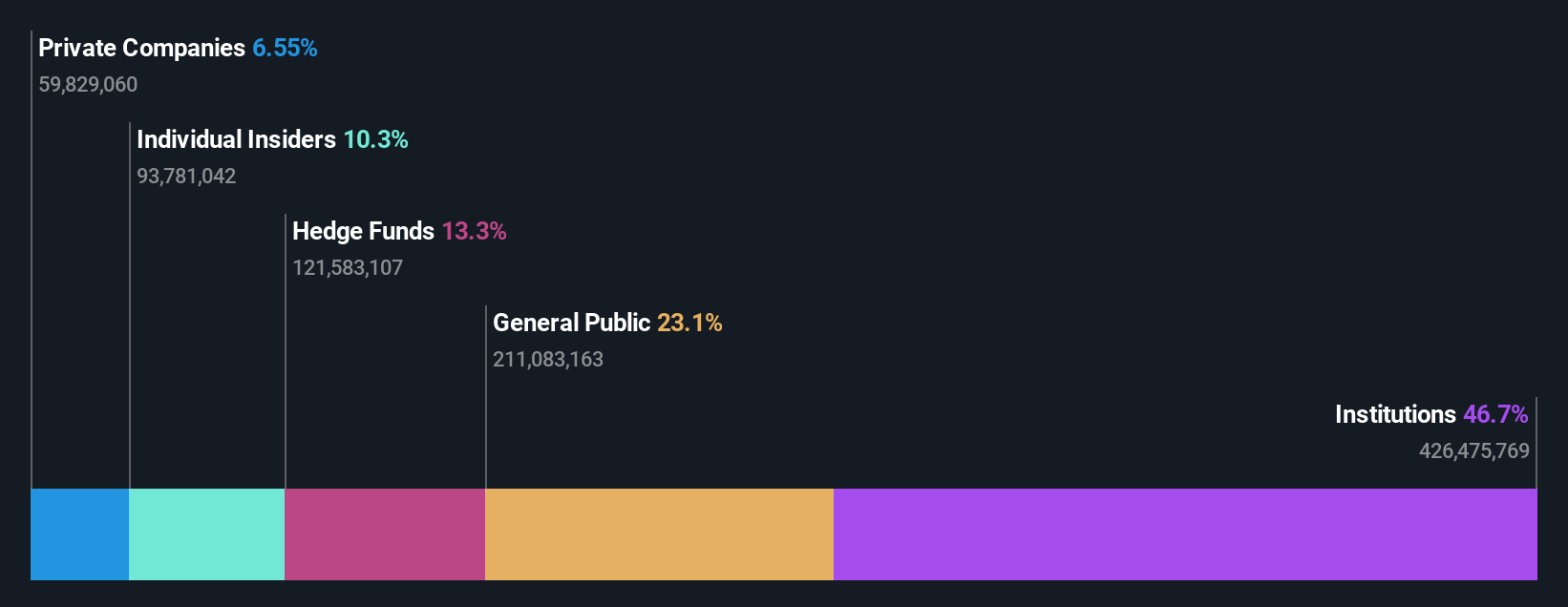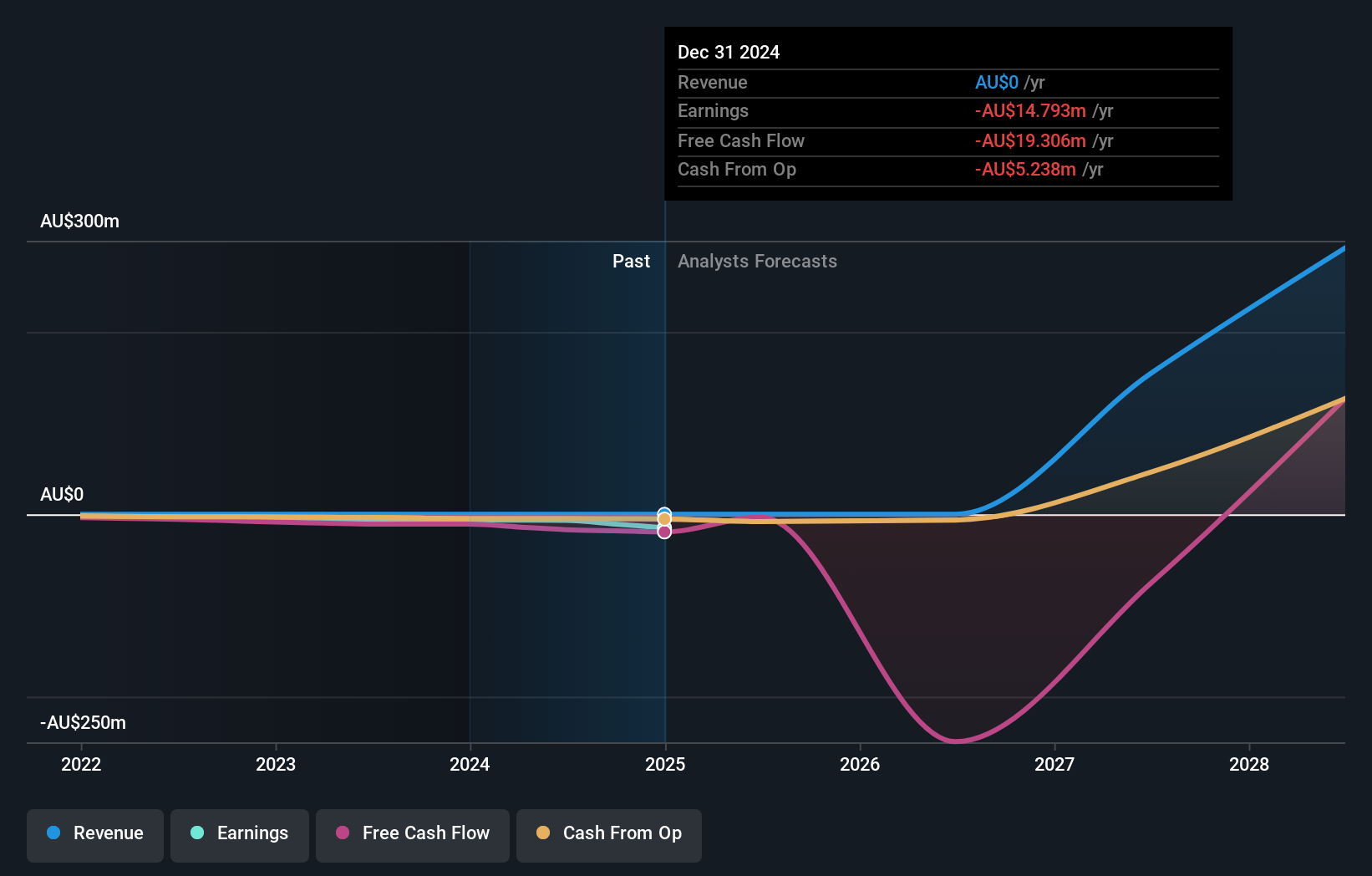- Australia
- /
- Oil and Gas
- /
- ASX:AEE
With 47% ownership in Aura Energy Limited (ASX:AEE), institutional investors have a lot riding on the business

Key Insights
- Institutions' substantial holdings in Aura Energy implies that they have significant influence over the company's share price
- A total of 6 investors have a majority stake in the company with 54% ownership
- 10% of Aura Energy is held by insiders
A look at the shareholders of Aura Energy Limited (ASX:AEE) can tell us which group is most powerful. We can see that institutions own the lion's share in the company with 47% ownership. In other words, the group stands to gain the most (or lose the most) from their investment into the company.
And last week, institutional investors ended up benefitting the most after the company hit AU$164m in market cap. The gains from last week would have further boosted the one-year return to shareholders which currently stand at 38%.
In the chart below, we zoom in on the different ownership groups of Aura Energy.
View our latest analysis for Aura Energy

What Does The Institutional Ownership Tell Us About Aura Energy?
Institutions typically measure themselves against a benchmark when reporting to their own investors, so they often become more enthusiastic about a stock once it's included in a major index. We would expect most companies to have some institutions on the register, especially if they are growing.
As you can see, institutional investors have a fair amount of stake in Aura Energy. This implies the analysts working for those institutions have looked at the stock and they like it. But just like anyone else, they could be wrong. It is not uncommon to see a big share price drop if two large institutional investors try to sell out of a stock at the same time. So it is worth checking the past earnings trajectory of Aura Energy, (below). Of course, keep in mind that there are other factors to consider, too.

It would appear that 13% of Aura Energy shares are controlled by hedge funds. That worth noting, since hedge funds are often quite active investors, who may try to influence management. Many want to see value creation (and a higher share price) in the short term or medium term. Macquarie Group, Ltd., Banking & Securities Investments is currently the company's largest shareholder with 13% of shares outstanding. With 9.8% and 9.7% of the shares outstanding respectively, Sprott Inc. and ALPS Advisors, Inc. are the second and third largest shareholders.
We did some more digging and found that 6 of the top shareholders account for roughly 54% of the register, implying that along with larger shareholders, there are a few smaller shareholders, thereby balancing out each others interests somewhat.
Researching institutional ownership is a good way to gauge and filter a stock's expected performance. The same can be achieved by studying analyst sentiments. There is some analyst coverage of the stock, but it could still become more well known, with time.
Insider Ownership Of Aura Energy
The definition of an insider can differ slightly between different countries, but members of the board of directors always count. The company management answer to the board and the latter should represent the interests of shareholders. Notably, sometimes top-level managers are on the board themselves.
I generally consider insider ownership to be a good thing. However, on some occasions it makes it more difficult for other shareholders to hold the board accountable for decisions.
Our information suggests that insiders maintain a significant holding in Aura Energy Limited. Insiders own AU$17m worth of shares in the AU$164m company. This may suggest that the founders still own a lot of shares. You can click here to see if they have been buying or selling.
General Public Ownership
With a 23% ownership, the general public, mostly comprising of individual investors, have some degree of sway over Aura Energy. While this size of ownership may not be enough to sway a policy decision in their favour, they can still make a collective impact on company policies.
Private Company Ownership
It seems that Private Companies own 6.6%, of the Aura Energy stock. It's hard to draw any conclusions from this fact alone, so its worth looking into who owns those private companies. Sometimes insiders or other related parties have an interest in shares in a public company through a separate private company.
Next Steps:
I find it very interesting to look at who exactly owns a company. But to truly gain insight, we need to consider other information, too. Case in point: We've spotted 4 warning signs for Aura Energy you should be aware of, and 3 of them are significant.
But ultimately it is the future, not the past, that will determine how well the owners of this business will do. Therefore we think it advisable to take a look at this free report showing whether analysts are predicting a brighter future.
NB: Figures in this article are calculated using data from the last twelve months, which refer to the 12-month period ending on the last date of the month the financial statement is dated. This may not be consistent with full year annual report figures.
New: Manage All Your Stock Portfolios in One Place
We've created the ultimate portfolio companion for stock investors, and it's free.
• Connect an unlimited number of Portfolios and see your total in one currency
• Be alerted to new Warning Signs or Risks via email or mobile
• Track the Fair Value of your stocks
Have feedback on this article? Concerned about the content? Get in touch with us directly. Alternatively, email editorial-team (at) simplywallst.com.
This article by Simply Wall St is general in nature. We provide commentary based on historical data and analyst forecasts only using an unbiased methodology and our articles are not intended to be financial advice. It does not constitute a recommendation to buy or sell any stock, and does not take account of your objectives, or your financial situation. We aim to bring you long-term focused analysis driven by fundamental data. Note that our analysis may not factor in the latest price-sensitive company announcements or qualitative material. Simply Wall St has no position in any stocks mentioned.
About ASX:AEE
Aura Energy
Engages in the exploration and evaluation of mineral properties in Mauritania and Sweden.
Excellent balance sheet slight.
Similar Companies
Market Insights
Community Narratives




